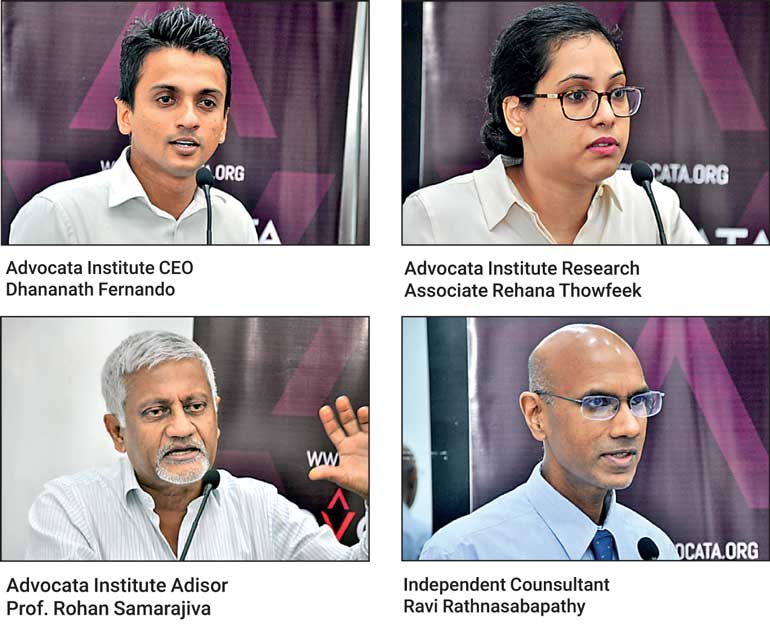Friday Feb 20, 2026
Friday Feb 20, 2026
Saturday, 14 October 2023 01:57 - - {{hitsCtrl.values.hits}}

A top panel of experts this week renewed the call for privatisation of State-owned enterprises (SOEs) saying this option was the need of the hour as the cumulative losses of 55 entities were a staggering Rs. 1.5 trillion during 15 years.
“At the interim budget last year, a list of SOEs reforms were provided to be restructured. 14 months later nothing has changed even in one SOE,” veteran policy expert and an advisor of the Advocata Institute Prof. Rohan Samarajiva said.
Speaking at an Advocata’s briefing, organised to highlight the urgency of carrying out reforms to SOE, which have become a burden to the economy, Samarajiva said: “The number of SOEs the Government has added to the list of SOEs to be privatised has expanded but nothing has changed in any of them.”
SOEs have played a fundamental part in the root of the current economic crisis, the large fiscal deficits the Government has been consistently incurring. From 2006-2021, the accumulated losses of SOE’s were Rs. 1.5 trillion and the debt owed by these enterprises was Rs. 1.8 trillion in 2021. Advocata Institute Research Associate Rehana Thowfeek said that the disregard for fiscal rules, such as the Fiscal Management (Responsibility) Act, as evidenced by the Government increasing the limit for guarantees on SOE liabilities have exacerbated the debt burden.
– Pix by Lasantha Kumara
“The root problem with SOEs are its conflicting objectives stemming from the lack of clearly defined ownership and responsibilities for each stakeholder where SOEs operate for the benefit of the Government and managers of SOEs who dole out public employment opportunities, abuse resources for political purposes, and use SOEs as an outlet for political patronage,” emphasised Thowfeek.
Expanding on how SOEs are a vehicle for corruption, Advocata Institute CEO Dhananath Fernando, explained that SOEs play a central role in facilitating corruption, and without a comprehensive restructuring, achieving transparency and freedom from corruption in the country remains elusive. He emphasised that with the upcoming election year, delaying these SOE reforms comes at a cost, as their debts continue to mount, potentially leading to a return to the recent economic crisis. “Restructuring SOEs offers a solution to four critical Government challenges: limited revenue, high expenditure, excessive debt, and a lack of foreign investments,” Fernando added.
Highlighting the lack of investments, Prof. Samarajiva explained that to attract these investments, the reform and restructuring process has to be transparent and well communicated. The opaqueness surrounding our current reform process has led to uncertainty resulting in a lack of investor confidence. He further explained that SriLankan Airlines have been in a state of limbo for the past one and half to two years regarding whether they will be privatised or not, which has not only prevented capital investments from coming in but has also led to the lack of incentives for the human capital to invest in the services they render. He reiterated that without these foreign investments, SOEs won’t be able to upgrade their services and operations as their earnings are primarily channelled towards the payment of employee salaries.
Independent consultant Ravi Ratnasabapathy raised crucial issues in relation to state banks and why they should be listed.
“The state banks become piggy banks that finance the vanities of various ministers” enabled by the letters of guarantee or comfort issued by the Treasury, particularly if the loans of these enterprises do not qualify under normal commercial criteria,” Ratnasabapathy said.
He explained that this has enabled entities, especially within the power sector to accumulate a cascade of circular debts in the power supply chain between the oil refinery, the power producer and other SOE end users. He recommended that it would be better if state banks do not further lend to SOEs and thereby not being a limitless source of finance that has built up to large hidden liabilities.